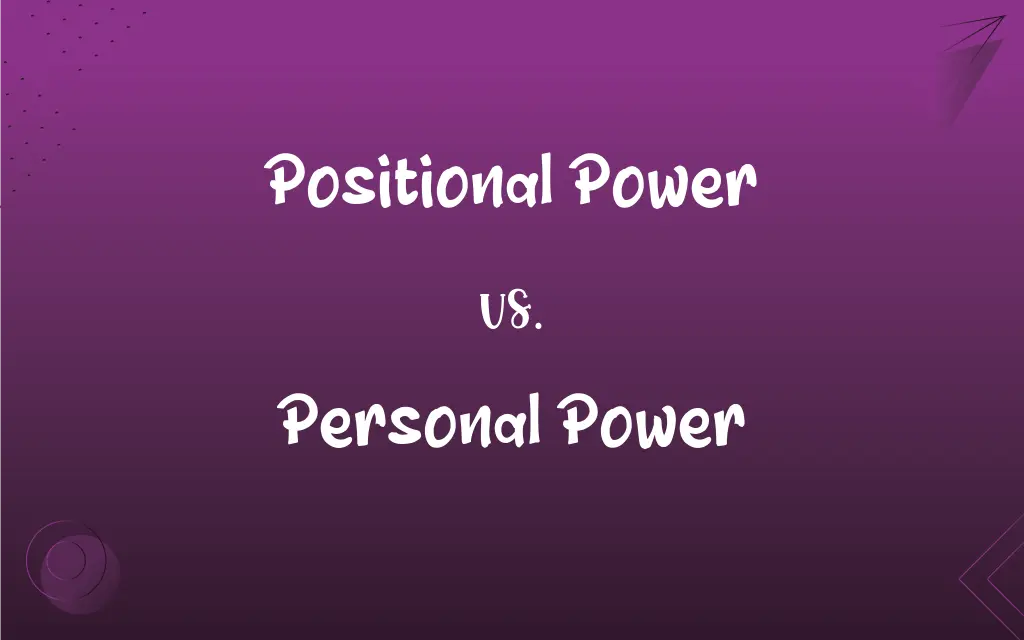Positional Power vs. Personal Power: What's the Difference?
Edited by Aimie Carlson || By Janet White || Published on December 8, 2023
Positional power is authority derived from a role or title, while personal power comes from an individual's qualities and influence.

Key Differences
Positional power and personal power are two distinct forms of authority and influence recognized in organizational and social dynamics. Positional power stems from a person's official status or role within an organization, granting them authority and control over resources and decision-making processes. Personal power, on the other hand, is derived from an individual's unique characteristics, such as charisma, expertise, or interpersonal skills, enabling them to influence others regardless of their formal position.
The effectiveness of positional power largely depends on the structure and rules of an organization, as it is linked to a specific title or role, like a manager or executive. This type of power is often associated with the ability to reward or punish, approve budgets, or make key business decisions. In contrast, personal power is rooted in the individual's ability to inspire, persuade, and connect with others, often leading to a more profound and lasting influence than that achieved through positional authority alone.
Positional power can be seen as more formal and potentially more transient, as it is tied to a particular role within an organization and can change when an individual leaves that position. This form of power can enforce compliance, but may not always engender loyalty or motivation among subordinates. Personal power, conversely, is inherently tied to the individual and is often perceived as more authentic. It is based on respect, admiration, and the personal qualities of the individual, which can lead to a more voluntary and enthusiastic following.
In the context of conflict resolution or negotiation, the dynamics of positional power versus personal power become particularly evident. An individual with positional power may resolve conflicts or negotiate terms based on their authority and the resources at their disposal. On the other hand, someone relying on personal power may leverage their relationships, persuasion skills, and emotional intelligence to find common ground and influence outcomes.
Understanding the balance between positional and personal power is crucial for effective leadership and management. A leader who relies solely on positional power may command obedience but might struggle to inspire true engagement and loyalty. Conversely, a leader who harnesses personal power can build stronger, more committed teams, but may face challenges in enforcing discipline or making unpopular decisions. Recognizing and developing both forms of power can lead to a more balanced and effective leadership approach.
ADVERTISEMENT
Comparison Chart
Basis
Role or title in an organization
Individual’s qualities and influence
Source of Influence
Authority of position
Charisma, expertise, relationships
Context Dependency
Context-specific (within organizational scope)
Versatile across various contexts
Stability
Stable as long as position is held
Fluctuates with personal development
Relationship Impact
Often hierarchical
More likely to be collaborative
ADVERTISEMENT
Positional Power and Personal Power Definitions
Positional Power
Positional power includes the ability to make decisions that affect others.
With his positional power, he set the department's budget.
Personal Power
Personal power is often associated with influence, regardless of formal position.
He used his personal power to negotiate a better outcome.
Positional Power
Positional power often comes with recognized status and formal authority.
Her positional power was evident in the board meetings.
Personal Power
Personal power grows from expertise and knowledge.
Her personal power in the field earned her widespread respect.
Positional Power
Positional power can enforce policies and rules within its scope.
Using his positional power, he enforced new operational procedures.
Personal Power
Personal power is derived from an individual’s charisma and interpersonal skills.
Through her personal power, she inspired her team to excel.
Positional Power
Positional power is often associated with a specific role within an organization.
As the manager, his positional power allowed him to allocate resources.
Personal Power
Personal power is independent of formal job titles and can be found at any level.
Despite his junior position, his personal power made him influential.
Positional Power
Positional power is the authority granted by a formal position or title.
Her positional power as CEO enabled her to implement major company changes.
Personal Power
Personal power fosters collaboration and mutual respect.
His personal power was key in building a cohesive team.
FAQs
Can personal power exist without a high-ranking position?
Absolutely, it's based on personal attributes, not position.
Is positional power limited to the workplace?
Mostly, as it's tied to organizational roles.
Can positional power change quickly?
It changes with organizational shifts and role changes.
How is personal power developed?
Through personal growth, skills, and relationships.
Can you lose positional power?
Yes, if the formal position is lost or changed.
Does positional power require a formal title?
Yes, it is tied to formal roles and titles.
How sustainable is personal power?
It's sustainable and grows with the individual’s development.
Is positional power effective in all situations?
Its effectiveness can be context-specific.
Is personal power linked to personality?
Partly, along with skills and experience.
Can personal power impact organizational culture?
Yes, significantly through influence and relationships.
Can personal power be taught?
Some aspects can be developed, like communication skills.
Are leaders with positional power always effective?
Not necessarily; effectiveness also depends on personal attributes.
Does personal power rely on others’ perceptions?
Yes, it's significantly influenced by how others perceive the individual.
Does personal power require technical skills?
It can, especially if expertise is the source of influence.
Which is more important for leadership, positional or personal power?
Both are important, but personal power often leads to more authentic and effective leadership.
How does positional power impact decision-making?
It often provides clear authority for decision-making.
How does personal power affect teamwork?
It generally fosters more collaboration and respect.
Is positional power always visible?
Typically, yes, through titles and roles.
Do people with positional power have personal power too?
They can, but the two are not automatically linked.
Can positional power lead to abuse of authority?
It can if not tempered with responsibility and ethics.
About Author
Written by
Janet WhiteJanet White has been an esteemed writer and blogger for Difference Wiki. Holding a Master's degree in Science and Medical Journalism from the prestigious Boston University, she has consistently demonstrated her expertise and passion for her field. When she's not immersed in her work, Janet relishes her time exercising, delving into a good book, and cherishing moments with friends and family.
Edited by
Aimie CarlsonAimie Carlson, holding a master's degree in English literature, is a fervent English language enthusiast. She lends her writing talents to Difference Wiki, a prominent website that specializes in comparisons, offering readers insightful analyses that both captivate and inform.































































